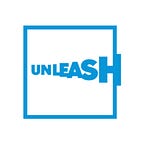Goto’s Second Chance
Unable to afford college himself, a Liberian education advocate works to advance opportunities for others
SHENZHEN, CHINA — “Everyone in my community saw me as a leader, as a mentor, as a motivator,” recalls Goto Cooper, an education advocate in Liberia, who graduated from high school in 2010 and immediately went off to college. “So I felt a lot of pain when I came back home after only one semester of university. It sparked a lot of questions — it still haunts me now.”
Cooper’s family could no longer afford to send him to school after just his one semester away. His mother was a street vendor, selling bread and meat-pies, and his father was unemployed,
“It was a deep, emotional time for me,” remembers Cooper, whose voice still cracks when discussing the subject. “And now as a mentor to young children, when I walk through a university campus, it’s painstaking — it still really hurts.”
He suffered another blow soon after he returned home, as his mother tragically passed away.
Putting his own dreams — of seeing the world, of a college education — on hold, in 2016 Cooper launched Educate the Future Liberia, a mentorship program meant to “unleash the potential in young, underprivileged children” in his home country. “I know what it means to be underprivileged,” he says, “to be hungry, to live in a dilapidated area, to go through pain. Now I’m using my energy to inspire others.”
In addition to mentoring youth in Liberia, Cooper is this week and next in Shenzhen, China, as one of 1,000 fellows participating in the UN SDG innovation lab known as UNLEASH. Cooper is one of about 100 “talents” (as UNLEASH fellows are known) participating in the SDG4 Education track, one of eight UNLEASH tracks that correlates directly to a UN SDG. Among his fellow SDG4 participants are talents from Greece, Serbia, Ecuador, Nigeria, the U.S., South Korea, Malaysia, and many other countries, who yesterday began the process of forming teams with each other and ideating solutions specifically to help achieve SDG4 and its 10 targets.
The UNLEASH talents are spread throughout Shenzhen, each track allocated to a different home base. After Wednesday’s opening ceremonies, the 100 talents of the Education track — whose base in China is Shenzhen Polytechnic University — were divided Thursday into four sub-themes:
- Access to Quality Education
- ICT and Vocational Training
- Educational Facilities
- Education for Vulnerable Populations
UNLEASH organizers allocated the talents in this track (as they do for the talents in all eight SDG-related tracks) each into one of the four sub-themes, based on their resumes and applications. Thursday, the talents also got a formal lecture on the SDGs, along with very specific details about the 10 “targets” of SDG4 (the 17 SDGs have 169 targets).
Facilitators for the SDG4 track work at Deloitte, UNDP, Save the Children, and other well-established brands and organizations. Yesterday morning, Helle Gudmandsen, of Save the Children, took the talents through the 10 targets of SDG4 in great detail. For each target, she had a relevant anecdote. “How many of you here know of Malala?” she asked in a Shenzhen Polytechnic plenary lecture hall while discussing Target 1 (universal primary and secondary education). “Malala is a strong advocate of 12 years of education for girls in Target 1, because she notes that the longer girls stay in school, the less chance they have of being a child bride. And 25% of all girls in her home country of Pakistan get married before they turn 18.”
Soon after the talents were allocated into one of the four sub-themes, they were assigned to a team. They spent a few hours getting to know their teammates going through a series of exercises, and together exploring and compiling a list of team values and ethics.
They will now spend the next five days going through an intense and highly structured ideation process that will see them have to pass through facilitator-approved “gates” at every step. The UNLEASH process strictly ensures that every team have an “insight,” which is a granularly focused social-good mission statement that will ultimately help move the needle forward on one of the SDGs.
Cooper was allocated to the Educational Facilities sub-theme, where he has been paired with three team-mates. “Education,” he says, while standing — once again — in the halls of a university “is the most powerful weapon that we can use to change our communities.”
